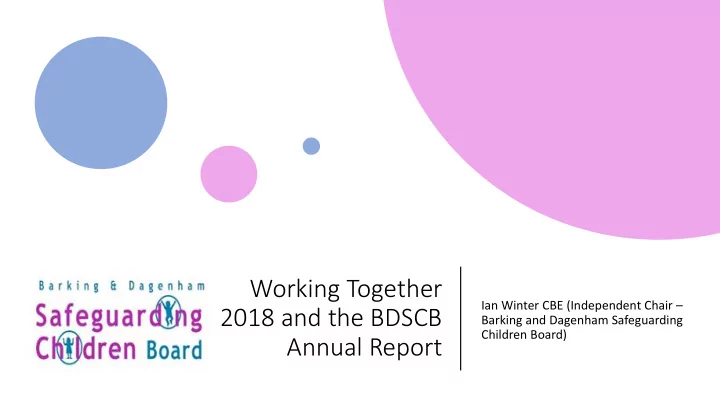

Working Together Ian Winter CBE (Independent Chair – 2018 and the BDSCB Barking and Dagenham Safeguarding Children Board) Annual Report
Principles of Project Working Together development 2018 outline Introduction Consultation Integration and with the engagement Annual Report
Key principles and approach • There must be a shared approach between organisations and agencies to safeguard and promote the welfare of all children in a local area. • The responsibility for this join-up locally rests with the three safeguarding partners who have a shared and equal duty to make Working arrangements to work together to safeguard and promote the welfare of all children in a local area. Together Strategic Partners 2018 • A safeguarding partner in relation to a local authority area in England is defined under the Children Act 2004 (as amended by the Children and Social Work Act, 2017) as: • (a) the local authority • (b) a clinical commissioning group • (c) the chief officer of police
The 3 Safeguarding Partners should… • Agree on ways to co-ordinate their safeguarding services; • Act as a strategic leadership group in supporting and engaging others; • Implement local and national learning including from serious Working child safeguarding incidents Together …and they must 2018 • Stipulate how they will work together, and with any relevant agencies. • (Relevant agencies are those organisations and agencies whose involvement the safeguarding partners consider may be required to safeguard and promote the welfare of children with regard to local need. )
Working Together 2018 The purpose of these local arrangements is to support and enable local These arrangements should link to organisations and agencies to work together in a system where: other strategic partnership work happening locally, including • children are safeguarded and their welfare promoted • partner organisations and agencies collaborate, share and co -own the vision for how to achieve improved outcomes for vulnerable children • Health and Wellbeing Boards, • organisations and agencies challenge appropriately and hold one another to • Adult Safeguarding Boards, account effectively • • there is early identification and analysis of new safeguarding issues and emerging Channel Panels, • threats Improvement Boards, • learning is promoted and embedded in a way that local services for children and • Community Safety Partnerships, families can become more reflective and implement changes to practice • Local Family Justice Board and • information is shared effectively to facilitate more accurate and timely decision MAPPAs . making for children and families
Working Together 2018 All arrangements must include setting out how: • Safeguarding partners will assure themselves that relevant agencies have appropriate, robust safeguarding policies and procedures in place and how information will be shared. • The arrangements to allow all schools (including multi academy trusts), colleges and other educational providers, in the local area to be fully engaged, involved and included in the new safeguarding arrangements. • Local safeguarding partners must name schools, colleges and other educational providers as relevant agencies and will reach their own conclusions on how best locally to achieve the active engagement of individual institutions in a meaningful way.
The role of independent scrutiny To provide Promote Respond to assurance of the continuous Inspectorates improvement effectiveness of multi-agency Supporting Independent Act as a arrangements Annual Critical Friend Scrutiny Reporting including those to identify and review Ensuring Ensure the SCR cases, as well strong child’s voice Leadership is heard as:
Summary of the BDSCB approach • Strategic Partners discussions • Short-term, specialist support has been • HWBB and Senior Officers Nov 2018 secured to deliver the programme of work • Consultation and engagement outline (left) • BDSCB Members (engagement and soundings) Dec 2018 Ongoing work • Draft proposals for wider consideration Jan 2019 • Discussions with Chairs/officers in • Final proposals for sign-off across the LBR/LBH/CCG/Police/LSCB Partners partnership Mar 2019 • Engagement with pan London Children's Safeguarding (London Councils) • Submit proposals to the Department • CDOP programme changes for BHRUT for Education May 2019 footprint arrangements (led by CCG)
Working Together and the Annual Report Setting out the Annual Report as an integral part of Working Together plans: The review of this year Integrated priorities from the Annual report drawn from reports Looking Forward across the Partnership and Strategic Partners demonstrates progress/challenges Future developments (e.g. contextual safeguarding) The work of the Partnership to respond to case reviews or serious incidents Achieving improved synergy across Partners and priority actions Training and development The emerging future proof programmes approach to Working Together • Produce detailed outline of proposed arrangements for submission to the DfE by June 2019 • Implement new arrangements by September 2019
BDSCB Annual Report A different approach to incorporate • Single Agency Reports Received Working Together 2018, but will include 21 Sep • First draft of Annual Report 1. Review of progress made 22 Oct 2. Learning from SCR’s and Practice Learning Reviews 3. Learning and Development Oct/Nov • 3x Editorial Groups 4. Performance and Quality Assurance 5. Budget Position • Substantive draft circulated 6. Our approach to Contextual Safeguarding 28 Nov 7. Highlights of Single Agency Reports 8. Strategic Partner Priorities • Board Sign-Off AND Jan 19 1. Future Safeguarding Partnership Arrangements
Discuss options for more effective joined up working What is and common themes across the Borough and Partners: General comment wanted from on the approach Adult safeguarding and programme the HWBB Domestic abuse/Community safety HWBB priorities
End Ian Winter CBE (Independent Chair – Barking and Dagenham Safeguarding Children Board) ian.winter@lbbd.gov.uk Chris Bush (Commissioning Director; LBBD Children’s Care & Support) christopher.bush@lbbd.gov.uk
Recommend
More recommend